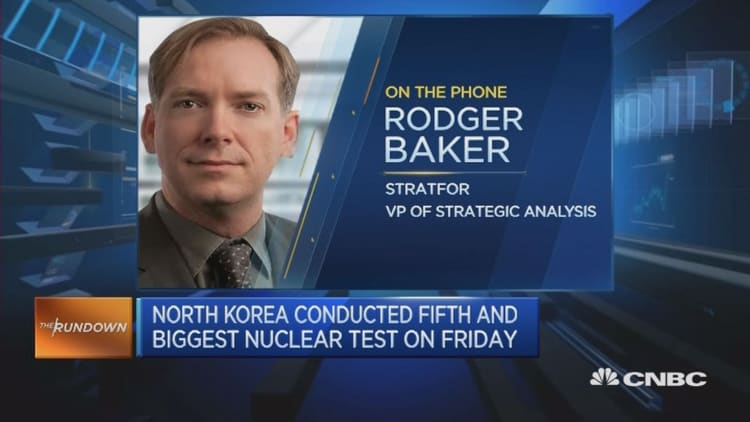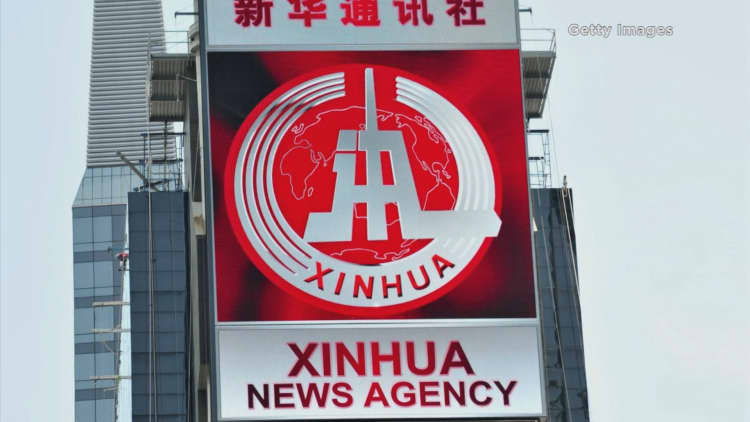


North Korea has reportedly geared up for another nuclear test, remaining defiant in the face of global censure after conducting its fifth and largest-yet test.
South Korea's Defense Ministry spokesman said on Monday that the rogue nation was ready to undertake a sixth test at any time, after claiming to have successfully tested a miniaturized nuclear warhead on Friday.
"Assessment by South Korean and U.S. intelligence is that the North is always ready for an additional nuclear test in thePunggye-ri area," South Korean Defence Ministry spokesman Moon Sang-gyun told a press conference. Punggye-ri, near the northeastern coast, is the site of the North's five nuclear explosions.
"North Korea has a tunnel where it can conduct an additional nuclear test," Moon said.
Meanwhile, a U.S. Forces official in South Korea told Reuters that the flight of a B-1B bomber to the Korean Peninsula, postponed on Monday due to bad weather, would go ahead on Tuesday.
Friday's test sparked criticism from the U.S. as well as neighbors China, South Korea and Japan and other countries. The U.N. Security Council said it would begin work immediately on a resolution, as the U.S., Britain and France pushed for the 15-member body to impose new sanctions, while a U.S. special envoy said the country may launch unilateral sanctions against North Korea.
Separately, the U.N. Office for the Coordination of Humanitarian Affairs said on Monday that 35,500 homes had been damaged by massive flooding in North Korea, with 133 dead in the North East of the country, according to Reuters. The U.N. agency said that 107,000 people had been displaced by the floods and 395 people were missing, according to Reuters.
On Monday, Japanese Prime Minister Shinzo Abe said that the country's nuclear tests were "absolutely unacceptable." while Japan's Defense Minister called North Korea a serious threat to international security.
But Pyongyang has so far shrugged off the fury caused by its nuclear test, which was conducted in violation of existing U.N. sanctions, as it has previous attempts to contain its nuclear weapons program.
North Korea said on Sunday that it was pushing ahead with a program to increase the quality and quantity of its "nuclear force," despite the threat of increased sanctions, describing how it was improving its nuclear-attack capabilities "moment by moment."
Any attempt by U.S. President Barack Obama to prevent North Korea from becoming a nuclear power was "as foolish an act as trying to eclipse the sun with a palm," according to a statement by the North Korea's foreign ministry on the state-run KCNA news site.
What can global powers do?
A former U.S. ambassador to South Korea told CNBC's "Squawk Box" on Monday that the U.S., China and South Korea needed to step up discussions on how to handle the rogue state.
"Their military testing program seems to be going faster than our policy adjustment to try to deal with them," said Christopher Hill, who is now the dean of the Josef Korbel School of International Studies at the University of Denver.
How they're getting the technology is probably through some various clandestine means or they just develop it themselves. They are pretty sophisticated in this one area. They can't seem to produce enough food for their people but they sure can produce nuclear devices.Christopher HillFormer U.S. ambassador to South Korea
A senior geopolitical analyst agreed.
The increased pace of testing was worrying because it suggested North Korea was pre-empting a move to prevent it progressing to the nuclear program's final development stages, Rodger Baker, Stratfor's vice president of strategic analysis, told CNBC's "The Rundown."
Pyongyang was also taking advantage of a window of opportunity in international relations while key players were distracted by their own politics, such as the U.S. presidential election in November and the South Korean presidential election in December 2017, he added.
The international community now faced the challenge of formulating a preventative strategy, Baker said, but warned that tougher sanctions would not work.
"North Korea sees sanctions really as a justification for further development of the nuclear weapons," said Baker. "[The nuclear program] no longer is bargaining tool, it's not something they are going to trade away, they do want to fully develop the program."
But former ambassador Hill cautioned that military solutions were "not very desirable" either.
"If you look at the map of the Korean Peninsula, you see so many urban areas of South Korea right up there on the border," he said. "I think there needs to be some effort, some imagination devoted to figuring out how to slow down this nuclear program."
China the key to containment
China quickly expressed its "firm opposition" to North Korea's tests on Friday.
"We have seen twists and turns in the situation of the Korean Peninsula since the beginning of this year, which put peace and stability of the region in jeopardy and run counter to the shared aspiration of the international community," the Chinese Foreign Affairs Ministry's spokesperson Hua Chunying told agency's regular press conference on Friday.
"It has been proved time and again that security concerns of parties on the Korean Peninsula must and can only be resolved in a way that serves all parties interests. Any unilateral action based on one's self-interest will lead to a dead end."
But there are criticisms that China has so far failed to move beyond rhetoric in tempering North Korea's aggression.
"In some way, China could exert a lot more on North Korea either through either enforcing extreme sanctions or potentially through interventional politics," Stratfor's Baker said. "But from the Chinese perspective, they are not willing to do the latter — that doesn't match their international position — and on the former, they are very concerned about destabilizing North Korea socially and having a crisis right on their border."
Other than not being ready for a regime change in their impoverished neighbor, the East Asian giant also faced domestic differences on how to deal with its traditional ally, with some fearing a new and bigger U.S.-backed Korean state.
"Many Chinese are embarrassed about this legacy of the past but there are other Chinese, notably in the security services, who regard pressure on North Korea as offering the possibility that North Korea would collapse and that a collapse of North Korea would mean Republic of Korea is the successor state and for them they see this as a victory for the U.S. and a defeat for China," Hill explained.
Japanese news agency Kyodo reported on Monday that North Korea's foreign minister had arrived in Beijing. Kyodo said that Ri Yong Ho was seen entering the North Korean embassy in the capital.
Chinese Communist Party-run newspaper The Global Times said in an editorial, meanwhile, that Beijing could not be blamed for North Korea's actions and instead blamed the U.S.
"China is not capable of persuading North Korea to give up nuclear development, because China's efforts are not supported bythe others," the newspaper said on Monday. "Washington has been refusing to sign a peace treaty with Pyongyang."
—CNBC's Katy Barnato and Reuters contributed to this report.

